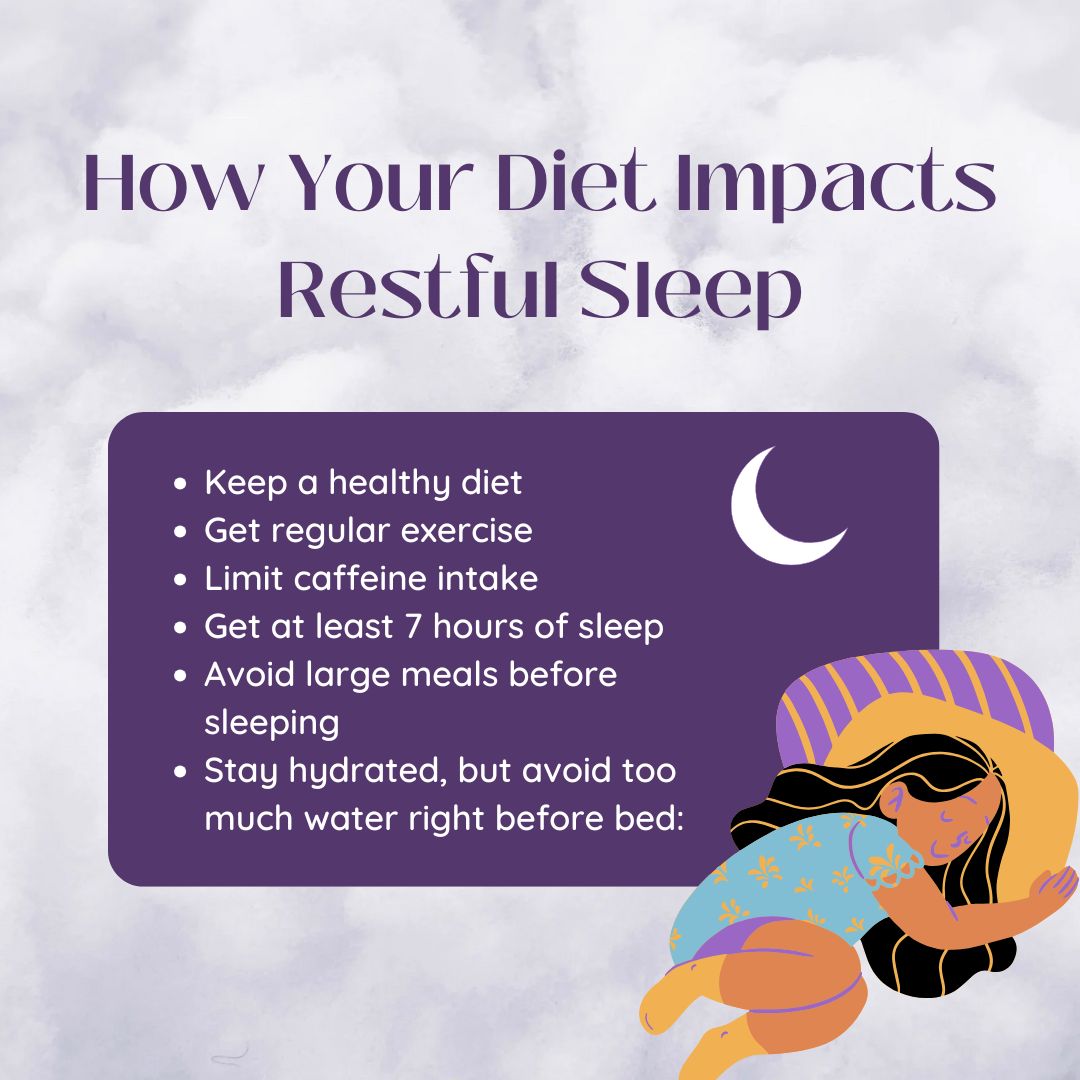The Connection Between Sleep and Health: How What You Eat Affects Your Rest 🛏️🥗
Introduction 🌙🍽️
If you’ve been struggling with sleepless nights or constant fatigue, your Diet might be the missing link. While many people focus on sleep hygiene or exercise for better rest, the truth is, what you eat plays a huge role in how well you sleep. From the foods you consume to the timing of your meals, your diet can directly influence how quickly you fall asleep, the quality of your sleep, and how rested you feel when you wake up. In this post, we’ll explore the deep connection between diet and sleep, and how you can eat your way to better, more restful sleep. 🌟
Why Sleep is Vital for Health 🧠💪
Good sleep is far from a luxury—it’s a cornerstone of overall health. Quality sleep is essential for many bodily functions, including:
-
Cognitive performance: Sleep boosts memory, focus, and decision-making.
-
Metabolism and weight regulation: Sleep influences hormones that control hunger and fat storage. 🍎
-
Immune system strength: Lack of sleep weakens the immune system, leaving you vulnerable to illness. 🦠
-
Mood and emotional stability: Sleep deprivation is linked to increased irritability and mood swings. 😴
-
Cellular repair and hormone balance: Sleep helps repair tissues and balances hormones. 🛠️
When sleep is disrupted, all of these functions suffer. That’s why it’s so important to prioritize not only the duration of your sleep but also its quality. 💤
The Food–Sleep Connection: How It Works 🥦💤
What you eat has a direct impact on the production of neurotransmitters and hormones like melatonin and serotonin. These compounds are responsible for regulating the sleep-wake cycle. For instance, melatonin is the hormone that signals your body that it’s time to sleep, while serotonin is linked to mood regulation and sleep cycles. 🧠
Additionally, your diet affects blood sugar levels, gut health, and digestion—all of which influence your ability to fall asleep and stay asleep. When your body is balanced nutritionally, it’s easier to get the rest you need. 🌙
Top Foods That Promote Better Sleep 🥑🍒
Eating the right foods can naturally support your body’s sleep cycle. Here are some of the best foods to incorporate into your diet for a restful night’s sleep:
1. Magnesium-Rich Foods 🥑
Magnesium is a mineral that helps calm the nervous system and promotes deeper sleep by regulating sleep-related neurotransmitters.
Best sources:
-
Almonds 🥜
-
Spinach 🌿
-
Pumpkin seeds 🎃
-
Black beans 🌱
-
Avocados 🥑
2. Tryptophan-Containing Foods 🦃
Tryptophan is an essential amino acid that helps your body produce serotonin and melatonin. This helps regulate your sleep cycle and improve sleep quality.
Best sources:
-
Turkey 🍗
-
Eggs 🍳
-
Cheese 🧀
-
Tofu 🍲
-
Oats 🌾
3. Complex Carbohydrates 🍠
Complex carbohydrates are slow-digesting foods that help stabilize blood sugar levels, which in turn supports melatonin production.
Examples:
-
Quinoa 🍚
-
Brown rice 🍚
-
Sweet potatoes 🍠
-
Barley 🌾
-
Whole-grain toast 🍞
4. Herbal Teas and Sleep-Inducing Drinks 🍵
Certain herbal teas have long been used for their sleep-promoting properties. Drinking these before bed can help you wind down.
Great options:
-
Chamomile tea 🌼
-
Warm almond milk 🥛
-
Valerian root tea 🌿
-
Tart cherry juice (natural melatonin source) 🍒
Foods That Disrupt Sleep ❌
Just as certain foods can improve your sleep, others can sabotage it. To ensure a peaceful night’s rest, avoid these foods, especially in the evening:
❌ Caffeine and Energy Drinks ☕
Caffeine blocks adenosine, a natural sleep-inducing chemical in the brain. Try to avoid caffeine after 2 PM to prevent it from interfering with your sleep.
❌ Sugary Treats 🍩
Sugar can cause energy spikes and crashes that can wake you up in the middle of the night. Avoid sugary snacks close to bedtime.
❌ Spicy or Fatty Foods 🌶️🍕
Spicy or fatty meals can cause indigestion or acid reflux, both of which disrupt sleep.
❌ Alcohol 🍷
Though alcohol can initially make you feel drowsy, it interferes with the REM sleep cycle, leading to fragmented rest.
Smart Eating Habits for Better Sleep 🍽️🌙
In addition to choosing the right foods, implementing some smart eating habits can help you sleep better:
-
🕖 Eat your last meal 2–3 hours before bedtime: This gives your body time to digest and reduces the risk of indigestion.
-
🥗 Keep dinners light and easy to digest: Focus on easily digestible meals to avoid any discomfort while you sleep.
-
💧 Stay hydrated, but avoid too much water right before bed: Staying hydrated is important, but excessive liquids before bed can lead to nighttime trips to the bathroom.
-
🧘♀️ Incorporate calming rituals like herbal teas or light stretching post-dinner: These rituals can help you unwind and prepare for rest.
Sample Sleep-Friendly Meal Plan 🍽️
Here’s a simple meal plan filled with sleep-supporting foods that will help you get the rest you deserve:
🌅 Breakfast:
Oatmeal with banana, flaxseeds, and a boiled egg 🍌🍳
🥗 Lunch:
Grilled salmon, sweet potato mash, sautéed spinach 🐟🍠
🌆 Dinner:
Quinoa salad with chickpeas, avocado, and pumpkin seeds, plus chamomile tea 🥗🍲🍵
🍒 Snack:
Greek yogurt with tart cherry puree 🥄🍒
Lifestyle Tips to Pair with Sleep-Friendly Eating 🛏️
To further improve your sleep, consider integrating these lifestyle changes alongside a healthy diet:
-
💤 Keep a consistent sleep schedule: Go to bed and wake up at the same time each day.
-
📱 Avoid screens at least 1 hour before bed: The blue light from phones, tablets, and computers can interfere with melatonin production.
-
🌙 Create a dark, cool sleeping environment: Darkness signals to your body that it’s time to sleep.
-
🧘 Practice mindfulness or journaling before bed: These relaxing activities can help you clear your mind and unwind.
Conclusion 💤
The road to better sleep doesn’t always start in the bedroom—it often begins in the kitchen. By making mindful food choices, you can align your diet with your body’s natural rhythms, leading to deeper and more restorative rest. Say goodbye to sleepless nights and hello to better mornings. Start eating your way to a healthier, more rested you! 🌟

